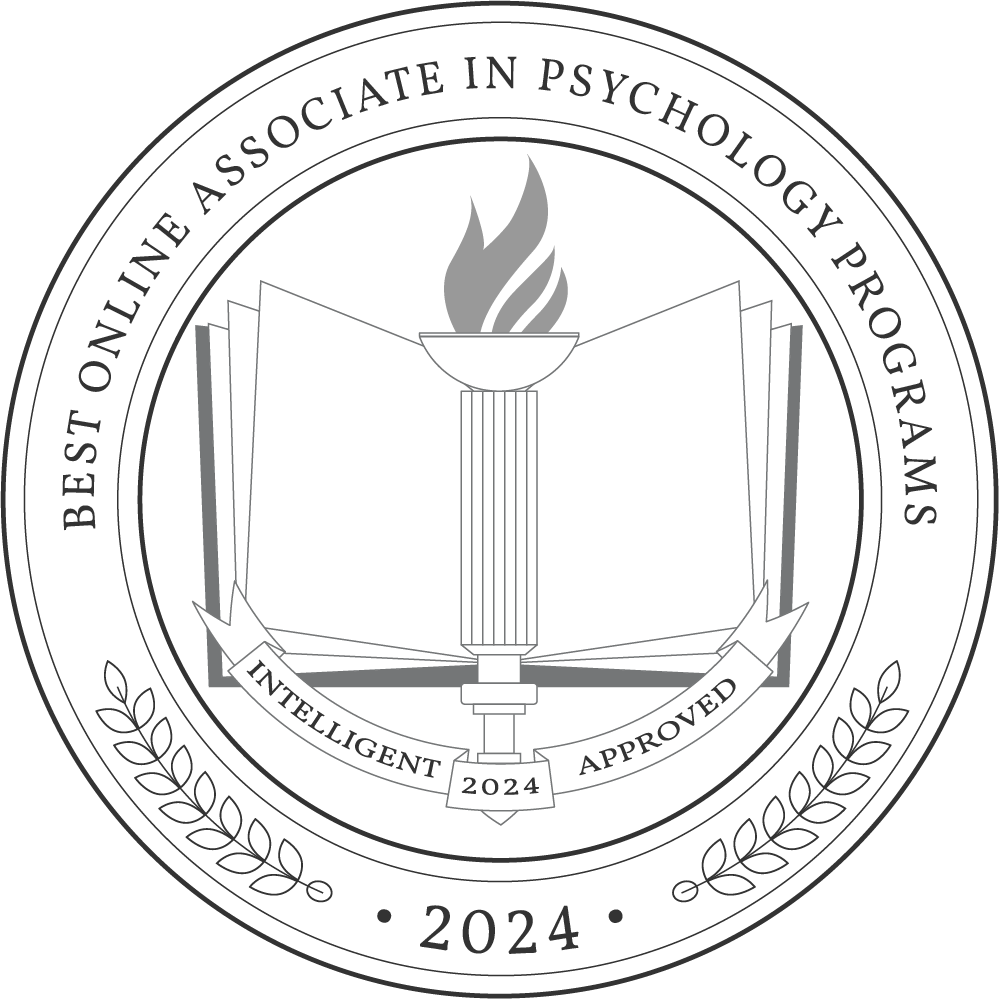Online associate in psychology degree programs offer an accessible and flexible pathway to foundational knowledge in psychology, perfectly suited for busy adults or those seeking a cost-effective start to their higher education journey.
While a doctoral degree is required to meet licensure requirements and practice as a psychologist, an associate degree is a valuable starting point. The demand for psychologists is expected to remain steady, with a projected 6% growth over the next decade and attractive salary prospects, with a median salary of $85,330 and the top 10% earning over $141,910.
Graduates with an associate degree can pursue social and human services assistance roles, a sector anticipating the need for 47,400 more professionals by 2032. Typically requiring just two years of full-time study and an average tuition of $11,976, an online associate in psychology is an affordable entry into a fulfilling and in-demand career.
How to Choose an Online Associate in Psychology Program
Choose your area of study
Pursuing an associate degree in psychology has a unique benefit in that you can use it as a period of exploration, leveraging general foundation coursework to discover your interests. It’s beneficial to start contemplating future specialties early, especially if you have a clear direction for your career.
Aligning coursework with your intended path can provide a head start in fields like clinical psychology, for those drawn to mental health care; organizations psychology, suited for those interested in workplace behavior; or child psychology, for those passionate about developmental stages. Each specialty accommodates different interests, enabling students to customize their education to match their career goals.
Research schools and programs
Once you’ve chosen a specialty or decided to maintain a general focus in psychology, thorough research on schools and programs is crucial. Consider the following questions to guide your research:
- Does a recognized accrediting body accredit the program?
- What specialties or concentrations are offered?
- How flexible are the course schedules for part-time students?
- What support services are available for online students?
- How do graduates perform in terms of employment or further education?
Information on programs and their accreditation can be found on school websites, through professional psychology associations, and by speaking with admissions counselors.
Prepare for tests and applications
After shortlisting schools for your degree, begin preparing for tests and applications by understanding standard admissions requirements. Compile your high school transcripts, letters of recommendation, and a unique personal statement for each school you’re applying to. While some schools have adopted test-optional policies, others may require SAT or ACT scores, so verifying each institution’s requirements is essential. Consider enrolling in a test prep program to improve your scores when these scores are required.
Select your program
Once acceptance letters arrive, you should revisit your initial criteria to choose the right program for your professional aspirations. Consider factors most important to your education — such as program accreditation, specialty tracks, flexibility of online courses, and faculty credentials. Weigh the total cost of attendance against available financial aid opportunities, scholarships, and grants. Balancing these priorities with your career goals and economic situation will guide you to the program that best aligns with your ambitions and resources.
Determine how you’ll pay for your degree
Paying for your degree can feel intimidating, but many financial aid resources are available to help you finance your education without incurring a significant debt burden.
Begin with scholarships and grants, which don’t require repayment and are essentially “free money.” Next, consider federal loans, which typically offer lower interest rates and more flexible repayment options than private loans. Work-study programs can also provide a source of income while gaining work experience. Additionally, if you’re employed, explore tuition reimbursement programs offered by your employer, which can significantly reduce out-of-pocket expenses.
Best 46 Accredited Online Associate in Psychology Programs
Institution Type
Status
- Intelligent Score
- Alphabetically By University Name
- Acceptance Rate
- Enrollment
- In-state Graduate Tuition
- Out-of-state Graduate Tuition
- In-state Undergraduate Tuition
- Out-of-state Undergraduate Tuition

Liberty University
Intelligent Score: 97.99Undergraduate Tuition
In-state: $14,791
Out-of-state: $14,791
Graduate Tuition
In-state: $7,935
Out-of-state: $7,935
Test scores
SAT: 1040-1250
ACT: 21-29
ESTIMATED COST PER CREDIT
$390
DELIVERY FORMAT
Online
ACCREDITATION
Southern Association of Colleges and Schools Commission on Colleges
REQUIRED CREDITS TO GRADUATE
60

Colorado Christian University
Intelligent Score: 97.66Undergraduate Tuition
In-state: $24,160
Out-of-state: $24,160
Graduate Tuition
In-state: $13,474
Out-of-state: $13,474
Test scores
SAT: N/A
ACT: N/A
ESTIMATED COST PER CREDIT
$494
DELIVERY FORMAT
Online
ACCREDITATION
Higher Learning Commission
REQUIRED CREDITS TO GRADUATE
60

Regent University
Intelligent Score: 97.29Undergraduate Tuition
In-state: $17,220
Out-of-state: $17,220
Graduate Tuition
In-state: $15,552
Out-of-state: $15,552
Test scores
SAT: 940-1220
ACT: 21-29
ESTIMATED COST PER CREDIT
$395
DELIVERY FORMAT
Online, On-Campus
ACCREDITATION
Southern Association of Colleges and Schools Commission on Colleges
REQUIRED CREDITS TO GRADUATE
63

South Texas College
Intelligent Score: 96.73Undergraduate Tuition
In-state: NA
Out-of-state: NA
Graduate Tuition
In-state: NA
Out-of-state: NA
Test scores
SAT: N/A
ACT: N/A
ESTIMATED COST PER CREDIT
In-District: $160 Out-of-District: $170
Non-Resident: $250
DELIVERY FORMAT
Online, On-Campus
ACCREDITATION
Southern Association of Colleges and Schools Commission on Colleges
REQUIRED CREDITS TO GRADUATE
60

Upper Iowa University
Intelligent Score: 96.01Undergraduate Tuition
In-state: $31,950
Out-of-state: $31,950
Graduate Tuition
In-state: $19,152
Out-of-state: $19,152
Test scores
SAT: 860-1046
ACT: 18-23
ESTIMATED COST PER CREDIT
$498
DELIVERY FORMAT
Online, On-Campus
ACCREDITATION
Higher Learning Commission
REQUIRED CREDITS TO GRADUATE
60

Casper College
Intelligent Score: 95.61Undergraduate Tuition
In-state: $15,868
Out-of-state: $20,908
Graduate Tuition
In-state: NA
Out-of-state: NA
Test scores
SAT: N/A
ACT: N/A
ESTIMATED COST PER CREDIT
In-State: $147
Out-of-State: $357
DELIVERY FORMAT
Online, On-Campus
ACCREDITATION
Higher Learning Commission
REQUIRED CREDITS TO GRADUATE
62

Northeast Community College
Intelligent Score: 95.01Undergraduate Tuition
In-state: $16,023
Out-of-state: $17,313
Graduate Tuition
In-state: NA
Out-of-state: NA
Test scores
SAT: N/A
ACT: 12-29
ESTIMATED COST PER CREDIT
Resident: $108
Non-Resident: $151
DELIVERY FORMAT
Online, On-Campus
ACCREDITATION
Higher Learning Commission
REQUIRED CREDITS TO GRADUATE
60

Sheridan College
Intelligent Score: 94.86Undergraduate Tuition
In-state: $19,695
Out-of-state: $25,995
Graduate Tuition
In-state: NA
Out-of-state: NA
Test scores
SAT: 510or higher
ACT: 18 or higher
ESTIMATED COST PER CREDIT
Resident: $161
Non-Resident: $371
DELIVERY FORMAT
Online, On-Campus
ACCREDITATION
Higher Learning Commission
REQUIRED CREDITS TO GRADUATE
60-61

Northwest Iowa Community College
Intelligent Score: 94.1Undergraduate Tuition
In-state: NA
Out-of-state: NA
Graduate Tuition
In-state: NA
Out-of-state: NA
Test scores
SAT: N/A
ACT: N/A
ESTIMATED COST PER CREDIT
$214
DELIVERY FORMAT
Hybrid
ACCREDITATION
Higher Learning Commission
REQUIRED CREDITS TO GRADUATE
60

Saint Joseph's College of Maine
Intelligent Score: 93.9Undergraduate Tuition
In-state: $38,820
Out-of-state: $38,820
Graduate Tuition
In-state: $9,482
Out-of-state: $9,482
Test scores
SAT: 908-983
ACT: 20-24
ESTIMATED COST PER CREDIT
$378
DELIVERY FORMAT
Online, On-Campus
ACCREDITATION
New England Commission of Higher Education
REQUIRED CREDITS TO GRADUATE
66

Southwestern Assemblies of God University
Intelligent Score: 91.55Undergraduate Tuition
In-state: $20,496
Out-of-state: $20,496
Graduate Tuition
In-state: $10,710
Out-of-state: $10,710
Test scores
SAT: 900-1120
ACT: 16-22
ESTIMATED COST PER CREDIT
$415
DELIVERY FORMAT
Online, On-Campus
ACCREDITATION
Southern Association of Colleges and Schools Commission on Colleges
REQUIRED CREDITS TO GRADUATE
63

Bucks County Community College
Intelligent Score: 91.08Undergraduate Tuition
In-state: $22,491
Out-of-state: $26,691
Graduate Tuition
In-state: NA
Out-of-state: NA
Test scores
SAT: N/A
ACT: N/A
ESTIMATED COST PER CREDIT
In-County Resident: $165 Out-of-County Resident: $330
Out-of-State: $495
DELIVERY FORMAT
Online, On-Campus
ACCREDITATION
Middle States Commission on Higher Education
REQUIRED CREDITS TO GRADUATE
60

University of the Cumberlands
Intelligent Score: 89.8Undergraduate Tuition
In-state: $9,875
Out-of-state: $9,875
Graduate Tuition
In-state: $4,282
Out-of-state: $4,282
Test scores
SAT: 930-1140
ACT: 19-24
ESTIMATED COST PER CREDIT
$220
DELIVERY FORMAT
Online
ACCREDITATION
Southern Association of Colleges and Schools Commission on Colleges
REQUIRED CREDITS TO GRADUATE
61

Cossatot Community College of the University of Arkansas
Intelligent Score: 89.05Undergraduate Tuition
In-state: NA
Out-of-state: NA
Graduate Tuition
In-state: NA
Out-of-state: NA
Test scores
SAT: N/A
ACT: N/A
ESTIMATED COST PER CREDIT
In-District: $74 Out-of-District: $87
Out-of-State: $102
DELIVERY FORMAT
Online
ACCREDITATION
Higher Learning Commission
REQUIRED CREDITS TO GRADUATE
60

Laramie County Community College
Intelligent Score: 88.4Undergraduate Tuition
In-state: $16,557
Out-of-state: $22,362
Graduate Tuition
In-state: NA
Out-of-state: NA
Test scores
SAT: N/A
ACT: 18 and above
ESTIMATED COST PER CREDIT
In-State: $153
Out-of-State: $363
DELIVERY FORMAT
Online, On-Campus
ACCREDITATION
Higher Learning Commission
REQUIRED CREDITS TO GRADUATE
62

Cerro Coso Community College
Intelligent Score: 87.97Undergraduate Tuition
In-state: $24,523
Out-of-state: $32,653
Graduate Tuition
In-state: NA
Out-of-state: NA
Test scores
SAT: Not Required
ACT: Not Required
ESTIMATED COST PER CREDIT
Resident: $46
Non-Resident: $388
DELIVERY FORMAT
Online, On-Campus
ACCREDITATION
Accrediting Commission for Community and Junior Colleges
REQUIRED CREDITS TO GRADUATE
60

Western Oklahoma State College
Intelligent Score: 87.09Undergraduate Tuition
In-state: $14,360
Out-of-state: $18,532
Graduate Tuition
In-state: NA
Out-of-state: NA
Test scores
SAT: 890-1110
ACT: 16-22
ESTIMATED COST PER CREDIT
Resident: $151
Non-Resident: $300
DELIVERY FORMAT
Online
ACCREDITATION
Higher Learning Commission
REQUIRED CREDITS TO GRADUATE
62

Union County College
Intelligent Score: 86.61Undergraduate Tuition
In-state: $30,094
Out-of-state: $30,094
Graduate Tuition
In-state: NA
Out-of-state: NA
Test scores
SAT: 1380
ACT: 17-26
ESTIMATED COST PER CREDIT
Resident: $214
Non-Resident: $385
DELIVERY FORMAT
Online
ACCREDITATION
Middle States Commission on Higher Education
REQUIRED CREDITS TO GRADUATE
60
How We Rank Schools
Students can earn either an associate of arts or an associate of science in psychology. Both types of degrees provide foundational coursework in psychological theories and skills, but with a different pedagogical approach.
We only included schools that have regional accreditation. This guarantees a high-quality standard in the education provided, and the credits and degree you earn will be transferable to most four-year colleges.
The programs on this list are offered in both online and on-campus formats. Many on-campus programs deliver courses in evening or weekend classes to facilitate attendance for people who are working or have other commitments.
We evaluated the flexibility, faculty, coursework, cost, and reputation of each program, and then we gave them an Intelligent Score on a scale of 0 to 100. For a more extensive explanation, check out our ranking methodology.
What Can You Expect From an Online Associate in Psychology Program
An online associate degree in psychology offers students a foundational understanding of psychological principles, theories, and research methods. Over approximately two years, learners will delve into topics such as human behavior, cognitive processes, and emotional well-being. Most coursework is available in flexible formats — either synchronous or asynchronous — to suit diverse schedules.
This degree serves as a financially feasible stepping stone for aspiring psychologists. While it marks the beginning of the educational journey toward licensure, achieving professional status in psychology will require further studies. Ultimately, this pathway can help you save money while laying the groundwork for a rewarding career in helping others.
Potential courses you’ll take in an online associate in psychology program
- Introduction to Psychology: This foundational course covers the broad spectrum of psychological theories and concepts, offering insight into human behavior, thought processes, and emotions. Students will learn about various psychological approaches, research methods, and applying psychological principles to real-world situations.
- Developmental Psychology: Focusing on the lifespan, this course examines the physical, cognitive, and social development of individuals from infancy through old age. Students will explore how people change and grow over time, understanding the factors that influence developmental milestones and challenges.
- Abnormal Psychology: This course delves into studying psychological disorders, their diagnosis, treatment, and prevention. Students will gain an understanding of the causes and symptoms of various mental health issues, exploring contemporary issues in mental health and the impact of stigma on treatment.
- Research Methods in Psychology: This course introduces students to the scientific methods used in psychological research — including experiment design, data collection, and analysis. Students will learn how to critically evaluate psychological research and gain hands-on experience in conducting experiments, preparing them for more advanced studies in psychology.
Online Associate in Psychology Degree Frequently Asked Questions
How do I apply to an online associate in psychology degree program?
Admission requirements for these programs typically include a high school diploma or GED, transcripts, and possibly standardized test scores, though requirements vary by school. Letters of recommendation and personal statements are also frequently required.
Connecting with an admissions counselor before applying is crucial. They can provide detailed information on prerequisites, guide you through the application process, and clarify any program-specific requirements. Their insight will ensure you understand the steps to submit a strong application tailored to your chosen institution.
How much does an online associate in psychology degree cost?
An online associate degree costs an average of $11,619 at public institutions and $27,366 at private schools. Public schools often offer more affordable tuition due to state funding and subsidies, but private institutions may offer attractive financial aid packages to make up the difference.
Beyond tuition, online programs frequently incur additional costs for technology, textbooks, and materials, though they usually save on commuting and housing expenses compared to in-person programs. It’s important to factor in these differences when budgeting for your degree, as the overall cost can vary significantly based on your learning mode and the type of institution you choose.
How long does it take to earn an online associate in psychology degree?
Earning an online associate in psychology degree typically takes two years when enrolled full-time. However, many students choose part-time enrollment to balance their studies with other responsibilities, such as having a full-time job or raising a family, extending the completion time.
The duration also depends on the number of required credits, with programs demanding more credits taking longer to finish.
